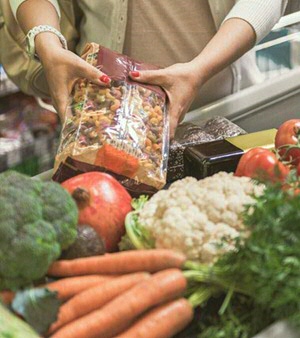Consumers will not choose the more sustainable option automatically

The nitrogen crisis, climate change, energy transition, ‘flight shame’ – sustainable behaviour is a topic that is impossible to avoid at the moment. Food takes up a key position in the discussion around sustainability. In order to produce enough food in the long term, it is crucial to find sustainable ways of doing this that damage the soil and the ecosystem as little as possible. Due in part to the push for sustainability, the organic food market has shown a steady growth of nearly 10% per year – but these statistics cannot hide the fact that the market share of organic food is still very low. In 2018, for example, the market share of organic food and drinks was only 3.4% of the total food sector turnover in the Netherlands.
Why do consumers not choose the more sustainable option more often? An argument that is often cited is that sustainable equals expensive but research shows that there may be more to it than that.
Research conducted by Prof. Jenny van Doorn and her colleagues shows that people do not always experience organic products as being any better than non-organic products, for example. On the contrary, if we look at food that we consume for enjoyment (‘vice’ foods), such as beer or chocolate, a lot of consumers associate organic products with a lower quality and worse taste. This in turn makes people less likely to buy these kinds of products. Above all, people do not want to pay more for organic food.
In another study, on the basis of supermarket data, we can see that the popularity of organic products depends on many factors: Firstly, it depends on the type of consumer: environment-aware consumers in particular tend to buy organic products. They do not mind paying a bit extra or having to go to a different shop to buy the products. This sector of the market is not very big yet, which partly explains the low market share of organic products until now. Secondly, organic products are more popular when people are looking for fresh produce rather than for processed food, and are less popular when people want to buy ‘vice’ food and drinks.
Research shows that consumers will not choose the more sustainable option automatically. The perceived quality of sustainable food plays a pivotal role for the consumer in this.
More information
- Jenny van Doorn
- Van Doorn, J., & Verhoef, P. C. (2011). Willingness to pay for organic products: Differences between virtue and vice foods. International Journal of Research in Marketing, 28(3), 167-180.
- Van Doorn, J., & Verhoef, P. C. (2015). Drivers of and barriers to organic purchase behavior. Journal of Retailing, 91(3), 436-450
More news
-
09 December 2025
Are robots the solution?
-
10 November 2025
Decentralization of youth care
